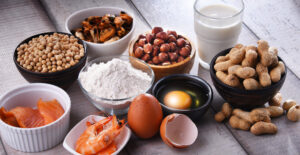Food Myths Busted: Debunking Common Nutrition Myths for Parents

As parents, we all want the best for our children, especially when it comes to their health and nutrition. However, with the abundance of information—and misinformation—available online and through word of mouth, it’s easy to get confused about what’s best for our kids. Let’s debunk some common nutrition myths to help you make informed decisions about your child’s diet.
Myth 1: Sugar Makes Kids Hyperactive
One of the most pervasive myths is that sugar causes hyperactivity in children. This belief has been around for decades, likely fueled by the observation that kids often seem more energetic at parties and holidays where sugary treats are abundant.
The Truth: Multiple scientific studies have shown that sugar does not cause hyperactivity. The apparent increase in energy levels is more likely due to the exciting environments in which sugary foods are often consumed, such as birthday parties or special events. While it’s important to moderate sugar intake to prevent issues like tooth decay and growth challenges, sugar itself is not the culprit behind hyperactive behavior.
Myth 2: Carbs Are Bad for Kids
With the rise of low-carb diets for adults, some parents worry that carbohydrates are unhealthy for their children as well. The idea that carbs contribute to weight gain and health problems has led some to limit their child’s intake of this essential macronutrient.
The Truth: Carbohydrates are a crucial part of a child’s diet, providing the energy needed for growth, learning, and physical activity. The key is to focus on complex carbs like whole grains, fruits, and vegetables rather than simple carbs found in sugary snacks and processed foods. Whole grains and other complex carbohydrates are packed with essential nutrients and fiber, promoting sustained energy and healthy digestion.
Myth 3: Fat Is Always Bad
Fat has long been demonized as the enemy of a healthy diet. Many parents aim to cut out as much fat as possible from their children’s meals, fearing it will lead to weight gain and other health issues.
The Truth: Not all fats are created equal. Healthy fats, such as those found in avocados, nuts, seeds, and olive oil, are vital for your child’s brain development, energy, and overall health. These fats help absorb fat-soluble vitamins (A, D, E, and K) and provide essential fatty acids that the body cannot produce on its own. Avoid trans fats and limit saturated fats, (those fats found in shelf-stable baked goods, ovely processed and deep fried foods) but embrace healthy fats as part of a balanced diet.
Myth 4: All Processed Foods Are Unhealthy
The term “processed food” often conjures images of junk food and unhealthy snacks. As a result, some parents strive to eliminate all processed foods from their children’s diets.
The Truth: While it’s true that many highly processed foods are high in sugar, salt, and unhealthy fats, not all processed foods are bad. Processing can include anything from freezing and canning to drying and pasteurizing, which can actually help preserve nutrients and make healthy foods more accessible. For example, canned beans, frozen vegetables, and whole-grain bread are processed foods that offer significant nutritional benefits. The key is to read labels and choose foods with simple ingredients.
Myth 5: Organic Foods Are Always Healthier
Organic foods are often marketed as the healthier choice, leading many parents to believe that organic products are superior to their non-organic counterparts.
The Truth: Organic foods can reduce exposure to pesticides and are often produced in environmentally friendly ways, but they are not necessarily more nutritious than conventional foods. The nutritional content of organic and non-organic foods is generally similar. It’s more important to ensure your child eats a variety of fruits, vegetables, whole grains, and proteins, regardless of whether they are organic or conventional.
Myth 6: Kids Need to Drink Fruit Juice for Vitamins
Fruit juice is frequently seen as a healthy beverage option for kids, providing essential vitamins and nutrients.
The Truth: While 100% fruit juice does contain vitamins, it also comes with a high concentration of natural sugars and lacks the fiber found in whole fruit. Drinking juice can contribute to excessive calorie intake and tooth decay. It’s better to offer whole fruits, which provide the same vitamins along with fiber that aids digestion and helps maintain a healthy weight. Water and milk should be the primary beverages for children, with juice offered in moderation.
Myth 7: A Vegetarian Diet Is Inadequate for Kids
Some parents worry that a vegetarian diet will not provide their children with all the necessary nutrients for growth and development.
The Truth: A well-planned vegetarian diet can be just as nutritious as one that includes meat. Key nutrients like protein, iron, calcium, vitamin B12, and omega-3 fatty acids can all be obtained from plant-based sources or fortified foods. For instance, beans, lentils, tofu, and dairy products provide protein and calcium, while leafy greens, fortified cereals, and supplements can cover iron and vitamin B12 needs. Consulting with a pediatric dietitian can help ensure your child’s vegetarian diet is well-balanced.
Understanding the truth behind these common nutrition myths can help you make better choices for your child’s diet. Focus on providing a variety of whole, minimally processed foods, and remember that moderation is key. By debunking these myths, we can foster healthier eating habits and ensure our children get the nutrition they need to thrive.


